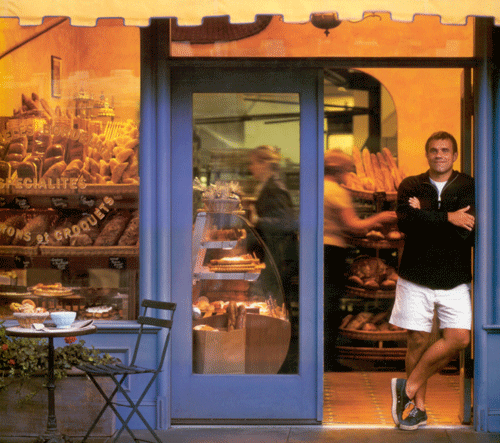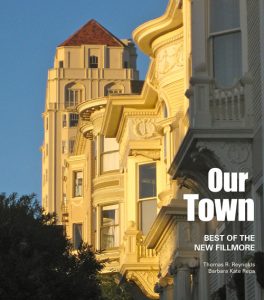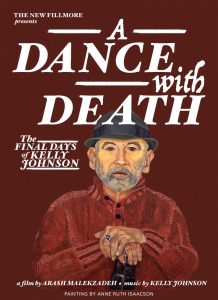FIRST PERSON | PASCAL RIGO
One morning not very long ago, I was eating breakfast with my family. We were sitting around the kitchen table in our apartment, which is above our bakery on Pine Street.
Like most days, I had taken a basket downstairs and pulled an assortment of freshly baked breakfast pastries off the racks. My wife Virginie and I were talking, and Oscar, the baby, was eating and playing with a spoon. But my two daughters, Juliette and Pauline, were just sitting there, staring at the pastries. I asked them, “What’s wrong?” They both looked up at me and said, “Nous voulons du pain” — “we want some bread.”
As I walked back downstairs to get them a baguette to chew on, I smiled and shook my head, thinking about how much my daughters reminded me of myself at their age. Of course, like all kids, I liked to eat desserts and pastries. But for as long as I can remember, what I loved even more was fresh bread. I just had this thing about it — the flavor, the smell, the texture. I can’t tell you why. It wasn’t as if I came from a long line of bakers. I was just fixated on bread. And not only bread. I was crazy about the bakery, too.
Every day, my mom would send me down to Monsieur Audouin’s boulangerie in our little village — Paillet, near Bordeaux — to pick up a couple of baguettes. I would inhale that smell of fermenting yeast and flour, breathe in that moist air, and peer past the counter into the bakehouse, where M. Audouin, who also happened to be the town’s mayor, would be working away. And for some reason I felt right at home.
I can’t quite remember exactly how those trips to the baker turned into an apprenticeship. It happened without any discussion or planning. It wasn’t something anyone told me to do, or something I had to do for money. It just happened, and then it gathered its own momentum, like dough rising in a warm place.
Eventually, I decided it was time to make a go of bread baking — but not in France. By the late ’80s in France, the writing was on the wall. Bakers, like all tradespeople there, were faced with really tough economic and political limitations, and I thought I’d test my wings in a place with more opportunities to work hard and succeed: the United States.
In January 1999, I took over an old Victorian building that was once a French laundry on Pine Street and turned it into a bakery. When it came time to put something on the signboard outside, I just had them put the word “Boulangerie.” I really didn’t think that little bakery would be much of a retail store. I was only planning to bake bread there and mostly sell it wholesale, and the storefront was basically the packing room for that wholesale business. But we thought we might as well put some bread in the window to sell to customers off the street.
Within a few days, you couldn’t find a parking space on the whole block. Word spreads quickly in San Francisco, especially when the word is “food.” People had begun to line up for bread outside our shop all morning long. So I thought I would make some croissants just for fun. The first day I made them, they sold out in 20 minutes. The next day we made more — and we made almond and chocolate ones, too.
A few days later, we thought, “Why not try some miniature palmier cookies?” We put them in little bags and before we knew it we were selling 200 bags a day. Then the San Francisco Examiner gave us a great review, and that was it. No turning back.
Bit by bit, we kept adding new breads and pastries, and people seem to love them. Today we have more than 70 items in the bakery. Along with the classic bread and pastry items, there are special things for every season and every big holiday, along with regional specialties from all over France.
I think what has made our bakery unique can be expressed in a single word that defines everything we do: authenticity. I don’t just mean that we make exact copies of the breads and pastries you would find in a boulangerie in France. I am talking about a respect for tradition that comes through as soon as you walk into the shop: you can see it, smell it, hear it, and of course taste it, and I wouldn’t want to have it any other way.
These days, I think we are all more hungry than ever for simple, honest authenticity, in every part of our lives, and it feels good to share that kind of approach through our bakery.
So here I am, living above the bakery with Virginie, Juliette, Pauline and Oscar. Our days begin with bread and pastry, and our lives are filled with the aroma of the bakery — the powerful, comforting smells of yeast and steam. My kids breathe in those smells. They see the importance of hard work, the value of respect for the customer, and most of all, the beautiful results that simplicity and authenticity can bring. Those are the gifts I want most to give to them.
Looking back at my life so far, it occurs to me that what I have really done is to end up right where I began. I have tried to re-create for my family, myself and everybody around us all the things I loved most about my own childhood.
And that is what I will keep trying to do. Because, like a great round loaf of country bread, the boulanger’s apprenticeship has no beginning and no end. It is a circle, and if you are very lucky, it lasts your whole life long.
Pascal Rigo owns Boulangerie Bay Bread on Pine Street. This article is excerpted from his book, The American Boulangerie.
Filed under: First Person, Food, Drink & Lodging





